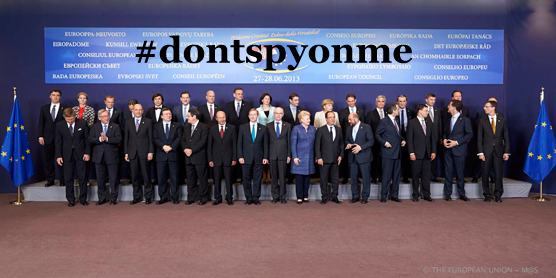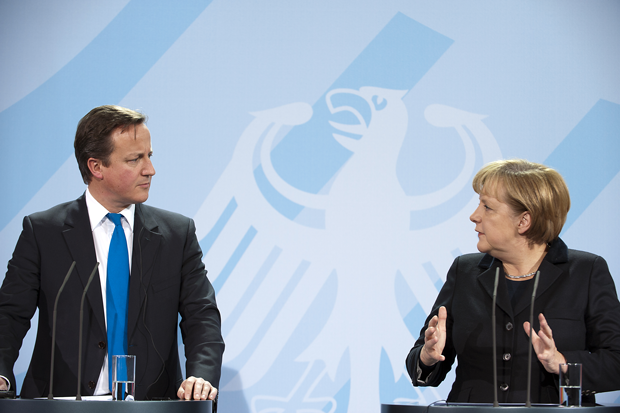25 Jul 2013 | Campaigns, Digital Freedom, Press Releases

Today, Index on Censorship launches a petition calling on European Union Heads of Government to stop the US, UK and other governments from carrying out mass surveillance. We want to use public pressure to ensure Europe’s leaders put on the record their opposition to mass surveillance. They must place this issue firmly on the agenda for the next European Council Summit in October so action can be taken to stop this attack on the basic human right of free speech and privacy.
We’d be grateful if you could support our efforts by signing and sharing the petition with the hashtag #dontspyonme
This petition is supported by Index on Censorship, English PEN, Article 19, Privacy International, Open Rights Group and Liberty, European Federation of Journalists, International Federation of Journalists, PEN International, PEN Canada, PEN Portugal, Electronic Frontier Foundation, PEN Emergency Fund, Canadian Journalists for Free Expression (CJFE), the National Union of Somali Journalists and the Bahrain Center for Human Rights.
Add your voice: http://chn.ge/1c2L7Ty
Support our efforts by signing and sharing the petition with the hashtag #dontspyonme
22 Jul 2013 | Comment, Digital Freedom, Europe and Central Asia, News and features, United Kingdom, United States
There have been some sharply contrasting political reactions to the US and UK’s mass surveillance programmes in European countries in recent days. Could the US perhaps play divide and rule in managing the fallout from Snowden’s revelations in Europe? Or is there enough common ground between German, UK or even Russian politicians to push for real changes in US (and UK and French) snooping?

(Photo: Gonçalo Silva / Demotix)
At first glance, it seems the issue is being damped down in the UK in contrast to angry and sustained political debate in Germany, and a more nationalist and opportunistic response by Russian politicians.
Last week British MPs on parliament’s intelligence and security committee confirmed that GCHQ, the UK’s signals intelligence HQ, had indeed obtained intelligence from the US Prism programme. But they concluded, remarkably quickly (no long investigation here), that allegations of law-breaking were “unfounded”. Whether the MPs are right or not, their report in fact only concerns part of Prism – the ‘content’ data GCHQ accessed and not the reams of metadata which can be equally or more revealing about individuals’ activities; and it doesn’t touch at all on the so-called Tempora programme by which, according to Snowden, the UK has been accessing massive amounts of data, by tapping into underwater cables, on a scale that goes beyond even US activities.
Meanwhile in Berlin last week, German politicians on the Bundestag’s control committee – were demanding answers on the NSA revelations from interior minister Hans-Peter Friedrich, who admitted he was still trying to get enough information out of the US on the reach of American surveillance. The following day, German journalists grilled Chancellor Angela Merkel’s spokesman for an hour and half about what the German government and security services already knew about US snooping, and how they will stop it.
Merkel has called on Obama to respect German laws though adding, rather curiously, “on German territory” – snooping on Germans on servers in the US or as their communications pass through underwater cables are side-lined by this emphasis. Merkel is also pushing for action at EU level, promising she will demand much tougher EU data protection laws – due to be agreed in the coming months. Germany’s political response seems in a much higher gear than in the UK.
Over in Moscow, some Russian MPs too are emphasising safeguards to protect personal data from US snooping. But with demands for big companies like Google and Facebook to respect Russian laws and pass on user data when requested (just as they have been in the US), this is not a sudden shift to political support for digital freedom in Russia. It is simple political opportunism taking full advantage of the NSA’s activities and revelations to reinforce Russia’s determined attempts domestically and internationally to control, monitor and impede a free and open internet.
But German, British or EU criticism of Russia’s attacks on digital freedom will be ignored and labelled hypocritical unless there is a much stronger condemnation of mass surveillance from European leaders and action to limit future abuses. Nor is this simply about whether intelligence services are operating within the law (and whose laws) important though that is. It is about ensuring laws do not allow the sort of mass surveillance domestically and internationally that the NSA, GCHQ – and it would seem France too – have been carrying out.
Here the report from the MPs on the British intelligence and security committee potentially opens up a vital debate. Incautious language, the MPs say that existing legislation is “expressed in general terms” and that GCHQ itself was right to put more detailed practices into place to ensure compliance with UK human rights law. Crucially, though a studied understatement, they say that the “complex interaction” between UK human rights laws and security laws needs further consideration – and commit the security committee to investigate further.
So more digging will happen in the UK, in Germany – and too at EU level thanks to the efforts of the European Parliament.
But the UK is clearly as complicit as the US in mass surveillance. And there is growing and sharper questioning in Germany of how much the government and the security services previously knew about US and UK snooping.
So where new revelations and investigations will take European countries in the coming weeks is an open question. And whether we will see a united defence of digital freedom in Europe and an end to mass surveillance is at best unclear for now and, more probably, highly unlikely.
Kirsty Hughes is the CEO of Index on Censorship. She tweets @Kirsty_Index
11 Jul 2013 | Events
Free speech, Mass Surveillance and Modern Media: how free are we and who decides?
Updating a status, tweeting a celebrity, Instagramming our breakfast- we all do it, but how much do you think about who is seeing what you put online? Social media is constantly hitting the headlines as people are arrested for posting a picture or sending a tweet without thinking of the real-life consequences. But should what happens online stay online? And can our governments ever be justified in reading our private messages in order to keep us safe?
If you want to discuss, argue or learn a bit more about these issues then join Index on Censorship and the Lewisham Youth Parliament and Young Mayor for, “Mass surveillance and modern media: who’s in control?”, to debate how our freedom of expression is being challenged by these developments in modern communication.
The event will be part debate and part workshop starting with a panel and Q&A session between Index on Censorship’s CEO, Kirsty Hughes and Philip Cowell, Head of Programmes at English PEN. It will be chaired by Index’s Head of Advocacy, Mike Harris. You will get to the chance to challenge our speakers on the key issues before breaking into workshop groups to discuss, and attempt to answer, some of the most problematic issues facing free speech online:
If we voluntarily put all our information online do we still deserve the right to privacy?
Where would you draw the line on offensive speech made on social media?
Do you mind our government reading your emails in the name of national security?
The event will be hosted at the Albany Theatre in Deptford Monday 22nd July from 5-7pm for young people between 14-20 years old. There is limited space so if you would like to take part in this exciting debate please email Fiona Bradley
[email protected] to reserve you place.
24 Jun 2013 | Campaigns, Digital Freedom
Index on Censorship is extremely concerned about the reported extent of mass surveillance of both meta data and content, resulting from the alleged tapping into underwater cables that carry national and international communications traffic.
Index calls on the UK government to clarify the extent and legality of the alleged surveillance by GCHQ. Index believes that GCHQ is circumventing laws such as the Regulation of Investigatory Powers Act (RIPA) to allow surveillance that undermines the human rights of British and other citizens.
Index CEO Kirsty Hughes said:
“The mass surveillance of citizens’ private communications is unacceptable – it both invades privacy and threatens freedom of expression. The government cannot continue to cite national security as a justification without revealing the extent of its intrusion and the legal basis for collecting data on this scale. Undermining freedom of expression through mass surveillance is more likely to endanger than defend our security.”
Index is calling on the British government to:
• Confirm whether GCHQ is undertaking the mass surveillance of meta data and content by tapping into communications cables
• Clarify which laws are being used to authorise the collection of data by this method and on this scale
• Commit to protecting the right to privacy and to freedom of expression of people living in the UK and beyond


